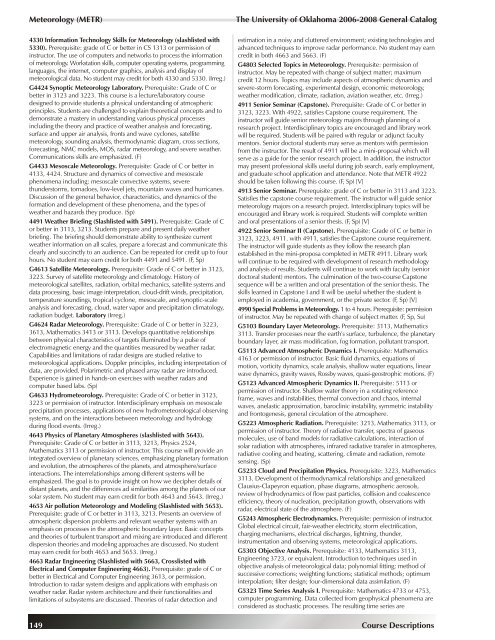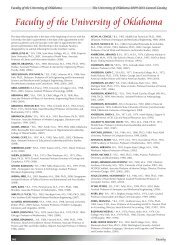2006-08 Course Descriptions - Catalog - University of Oklahoma
2006-08 Course Descriptions - Catalog - University of Oklahoma
2006-08 Course Descriptions - Catalog - University of Oklahoma
Create successful ePaper yourself
Turn your PDF publications into a flip-book with our unique Google optimized e-Paper software.
Meteorology (METR)The Uni ver sity <strong>of</strong> <strong>Oklahoma</strong> <strong>2006</strong>-20<strong>08</strong> Gen eral Cat a log4330 Information Technology Skills for Meteorology (slashlisted with5330). Prerequisite: grade <strong>of</strong> C or better in CS 1313 or permission <strong>of</strong>instructor. The use <strong>of</strong> computers and networks to process the information<strong>of</strong> meteorology. Workstation skills, computer operating systems, programminglanguages, the internet, computer graphics, analysis and display <strong>of</strong>meteorological data. No student may credit for both 4330 and 5330. (Irreg.)G4424 Synoptic Meteorology Laboratory. Prerequisite: Grade <strong>of</strong> C orbetter in 3123 and 3223. This course is a lecture/laboratory coursedesigned to provide students a physical understanding <strong>of</strong> atmosphericprinciples. Students are challenged to explain theoretical concepts and todemonstrate a mastery in understanding various physical processesincluding the theory and practice <strong>of</strong> weather analysis and forecasting,surface and upper air analysis, fronts and wave cyclones, satellitemeteorology, sounding analysis, thermodynamic diagram, cross sections,forecasting, NMC models, MOS, radar meteorology, and severe weather.Communications skills are emphasized. (F)G4433 Mesoscale Meteorology. Prerequisite: Grade <strong>of</strong> C or better in4133, 4424. Structure and dynamics <strong>of</strong> convective and mesoscalephenomena including: mesoscale convective systems, severethunderstorms, tornadoes, low-level jets, mountain waves and hurricanes.Discussion <strong>of</strong> the general behavior, characteristics, and dynamics <strong>of</strong> theformation and development <strong>of</strong> these phenomena, and the types <strong>of</strong>weather and hazards they produce. (Sp)4491 Weather Briefing (Slashlisted with 5491). Prerequisite: Grade <strong>of</strong> Cor better in 3113, 3213. Students prepare and present daily weatherbriefing. The briefing should demonstrate ability to synthesize currentweather information on all scales, prepare a forecast and communicate thisclearly and succinctly to an audience. Can be repeated for credit up to fourhours. No student may earn credit for both 4491 and 5491. (F, Sp)G4613 Satellite Meteorology. Prerequisite: Grade <strong>of</strong> C or better in 3123,3223. Survey <strong>of</strong> satellite meteorology and climatology. History <strong>of</strong>meteorological satellites, radiation, orbital mechanics, satellite systems anddata processing, basic image interpretation, cloud-drift winds, precipitation,temperature soundings, tropical cyclone, mesoscale, and synoptic-scaleanalysis and forecasting, cloud, water vapor and precipitation climatology,radiation budget. Laboratory (Irreg.)G4624 Radar Meteorology. Prerequisite: Grade <strong>of</strong> C or better in 3223,3613, Mathematics 3413 or 3113. Develops quantitative relationshipsbetween physical characteristics <strong>of</strong> targets illuminated by a pulse <strong>of</strong>electromagnetic energy and the quantities measured by weather radar.Capabilities and limitations <strong>of</strong> radar designs are studied relative tometeorological applications. Doppler principles, including interpretation <strong>of</strong>data, are provided. Polarimetric and phased array radar are introduced.Experience is gained in hands-on exercises with weather radars andcomputer based labs. (Sp)G4633 Hydrometeorology. Prerequisite: Grade <strong>of</strong> C or better in 3123,3223 or permission <strong>of</strong> instructor. Interdisciplinary emphasis on mesoscaleprecipitation processes, applications <strong>of</strong> new hydrometeorological observingsystems, and on the interactions between meteorology and hydrologyduring flood events. (Irreg.)4643 Physics <strong>of</strong> Planetary Atmospheres (slashlisted with 5643).Prerequisite: Grade <strong>of</strong> C or better in 3113, 3213, Physics 2524,Mathematics 3113 or permission <strong>of</strong> instructor. This course will provide anintegrated overview <strong>of</strong> planetary sciences, emphasizing planetary formationand evolution, the atmospheres <strong>of</strong> the planets, and atmosphere/surfaceinteractions. The interrelationships among different systems will beemphasized. The goal is to provide insight on how we decipher details <strong>of</strong>distant planets, and the differences ad similarities among the planets <strong>of</strong> oursolar system. No student may earn credit for both 4643 and 5643. (Irreg.)4653 Air pollution Meteorology and Modeling (Slashlisted with 5653).Prerequisite: grade <strong>of</strong> C or better in 3113, 3213. Presents an overview <strong>of</strong>atmospheric dispersion problems and relevant weather systems with anemphasis on processes in the atmospheric boundary layer. Basic conceptsand theories <strong>of</strong> turbulent transport and mixing are introduced and differentdispersion theories and modeling approaches are discussed. No studentmay earn credit for both 4653 and 5653. (Irreg.)4663 Radar Engineering (Slashlisted with 5663, Crosslisted withElectrical and Computer Engineering 4663). Prerequisite: grade <strong>of</strong> C orbetter in Electrical and Computer Engineering 3613, or permission.Introduction to radar system designs and applications with emphasis onweather radar. Radar system architecture and their functionalities andlimitations <strong>of</strong> subsystems are discussed. Theories <strong>of</strong> radar detection andestimation in a noisy and cluttered environment; existing technologies andadvanced techniques to improve radar performance. No student may earncredit in both 4663 and 5663. (F)G4803 Selected Topics in Meteorology. Prerequisite: permission <strong>of</strong>instructor. May be repeated with change <strong>of</strong> subject matter; maximumcredit 12 hours. Topics may include aspects <strong>of</strong> atmospheric dynamics andsevere-storm forecasting, experimental design, economic meteorology,weather modification, climate, radiation, aviation weather, etc. (Irreg.)4911 Senior Seminar (Capstone). Prerequisite: Grade <strong>of</strong> C or better in3123, 3223. With 4922, satisfies Capstone course requirement. Theinstructor will guide senior meteorology majors through planning <strong>of</strong> aresearch project. Interdisciplinary topics are encouraged and library workwill be required. Students will be paired with regular or adjunct facultymentors. Senior doctoral students may serve as mentors with permissionfrom the instructor. The result <strong>of</strong> 4911 will be a mini-proposal which willserve as a guide for the senior research project. In addition, the instructormay present pr<strong>of</strong>essional skills useful during job search, early employment,and graduate school application and attendance. Note that METR 4922should be taken following this course. (F, Sp) [V]4913 Senior Seminar. Prerequisite: grade <strong>of</strong> C or better in 3113 and 3223.Satisfies the capstone course requirement. The instructor will guide seniormeteorology majors on a research project. Interdisciplinary topics will beencouraged and library work is required. Students will complete writtenand oral presentations <strong>of</strong> a senior thesis. (F, Sp) [V]4922 Senior Seminar II (Capstone). Prerequisite: Grade <strong>of</strong> C or better in3123, 3223, 4911. with 4911, satisfies the Capstone course requirement.The instructor will guide students as they follow the research planestablished in the mini-proposa completed in METR 4911. Library workwill continue to be required with development <strong>of</strong> research methodologyand analysis <strong>of</strong> results. Students will continue to work with faculty (seniordoctoral student) mentors. The culmination <strong>of</strong> the two-course Capstonesequence will be a written and oral presentation <strong>of</strong> the senior thesis. Theskills learned in Capstone I and II will be useful whether the student isemployed in academia, government, or the private sector. (F, Sp) [V]4990 Special Problems in Meteorology. 1 to 4 hours. Prerequisite: permission<strong>of</strong> instructor. May be repeated with change <strong>of</strong> subject matter. (F, Sp, Su)G5103 Boundary Layer Meteorology. Prerequisite: 3113, Mathematics3113. Transfer processes near the earth’s surface, turbulence, the planetaryboundary layer, air mass modification, fog formation, pollutant transport.G5113 Advanced Atmospheric Dynamics I. Prerequisite: Mathematics4163 or permission <strong>of</strong> instructor. Basic fluid dynamics, equations <strong>of</strong>motion, vorticity dynamics, scale analysis, shallow water equations, linearwave dynamics, gravity waves, Rossby waves, quasi-geostrophic motions. (F)G5123 Advanced Atmospheric Dynamics II. Prerequisite: 5113 orpermission <strong>of</strong> instructor. Shallow water theory in a rotating referenceframe, waves and instabilities, thermal convection and chaos, internalwaves, anelastic approximation, baroclinic instability, symmetric instabilityand frontogenesis, general circulation <strong>of</strong> the atmosphere.G5223 Atmospheric Radiation. Prerequisite: 3213, Mathematics 3113, orpermission <strong>of</strong> instructor. Theory <strong>of</strong> radiative transfer, spectra <strong>of</strong> gaseousmolecules, use <strong>of</strong> band models for radiative calculations, interaction <strong>of</strong>solar radiation with atmospheres, infrared radiative transfer in atmospheres,radiative cooling and heating, scattering, climate and radiation, remotesensing. (Sp)G5233 Cloud and Precipitation Physics. Prerequisite: 3223, Mathematics3113. Development <strong>of</strong> thermodynamical relationships and generalizedClausius-Clapeyron equation, phase diagrams, atmospheric aerosols,review <strong>of</strong> hydrodynamics <strong>of</strong> flow past particles, collision and coalescenceefficiency, theory <strong>of</strong> nucleation, precipitation growth, observations withradar, electrical state <strong>of</strong> the atmosphere. (F)G5243 Atmospheric Electrodynamics. Prerequisite: permission <strong>of</strong> instructor.Global electrical circuit, fair-weather electricity, storm electrification,charging mechanisms, electrical discharges, lightning, thunder,instrumentation and observing systems, meteorological applications.G5303 Objective Analysis. Prerequisite: 4133, Mathematics 3113,Engineering 3723, or equivalent. Introduction to techniques used inobjective analysis <strong>of</strong> meteorological data; polynomial fitting; method <strong>of</strong>successive corrections; weighting functions; statistical methods; optimuminterpolation; filter design; four-dimensional data assimilation. (F)G5323 Time Series Analysis I. Prerequisite: Mathematics 4733 or 4753,computer programming. Data collected from geophysical phenomena areconsidered as stochastic processes. The resulting time series are149 <strong>Course</strong> <strong>Descriptions</strong>








